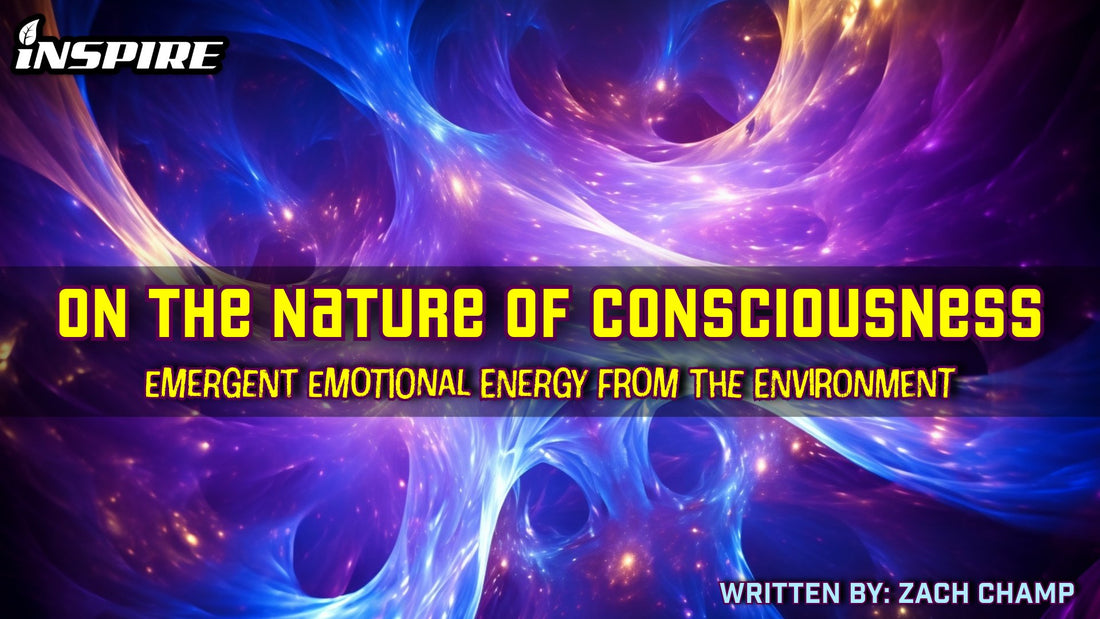Written By: Zach Champ
Connect with me on Instagram!
![]()
The enigma of consciousness has fascinated philosophers, scientists, and thinkers for centuries.
What is consciousness, and how does it arise within us?
Is it an inherent property of the brain, or does it emerge from the interaction with our environment?

This article delves into the intriguing concept of consciousness as an emergent emotional energy, intricately intertwined with the world around us...
Let us explore together the interplay between our inner selves and the external environment, shedding light on the connection between consciousness and the world around us.
![]()
UNDERSTANDING CONSCIOUSNESS:
Consciousness, often referred to as the "hard problem" in philosophy of mind, remains one of the most puzzling aspects of human existence. It encompasses our subjective experiences, thoughts, emotions, and perceptions– the very essence of our awareness.
Yet, despite advances in neuroscience and cognitive science, a comprehensive explanation of consciousness continues to elude us.

One prevailing theory suggests that consciousness arises as a result of complex interactions among neural networks in the brain. These networks process sensory information from the World us, integrate it with past experiences, and generate our conscious experience.
The mind produces biochemical based electrical energy through the active flow of neurotransmitters and flow of blood to the brain.

The human brain is the engine of the mind.
Without it, we have no consciousness…
The brain controls all aspects of the body, both subtly and automatically, as well as with purposeful conscious intent (autonomic nervous system vs the central nervous system).
While this neural perspective provides valuable insights, it may not account for the full extent of our conscious awareness.
![]()
EMERGENT EMOTIONAL ENERGY:
To gain a deeper understanding of consciousness, we must also consider the role of emotions and their connection to the environment.

Emotions play a fundamental role in shaping our experiences and influencing our perceptions. Our emotional states can color how we interpret events and interact with the world.
Interestingly, emotions can also be influenced by external factors, such as our social environment, the natural surroundings, or even the collective emotional energy of a group.

In this context, consciousness can be viewed as an emergent form of emotional energy that arises from our interactions with the environment.
When we experience beauty in nature, connect deeply with others, or engage in meaningful activities, our emotional energy becomes amplified.
These positive emotional states can lead to a heightened sense of consciousness, as if we are more attuned to our surroundings and more aware of our place within the larger tapestry of life.

Conversely, negative emotional experiences can also impact consciousness. Stress, anxiety, or feelings of isolation can diminish our sense of presence and lead to a narrowing of focus, as if the world around us becomes less vivid.
The emotional energy we encounter in our environment can either uplift or dampen our consciousness, shaping our perspectives and influencing our behavior.

There is profound spiritual wisdom in this understanding, and by applying practices which allow us to regulate our emotions positively we can achieve inner peace and grace, ala the Zen of Buddhism or the passion of Jesus Christ.
This is the secret teaching of spiritual sects around the World and across religions!
![]()
THE CONNECTION WITH THE ENVIRONMENT:
The environment, in all its facets, plays a crucial role in shaping our emotional experiences and, consequently, our consciousness.
As we said before, Nature's beauty can evoke awe and wonder, triggering a sense of interconnectedness and harmony.
The presence of supportive and nurturing social environments can foster positive emotional energy, promoting a heightened state of awareness and empathy.

On the other hand, urban environments characterized by noise, pollution, and social disconnection can contribute to emotional stress and a diminished sense of consciousness.
The digital world, with its constant stimuli and virtual interactions, may also impact our emotional states and, consequently, our consciousness.
![]()
HARNESSING CONSCIOUSNESS FOR WELL-BEING:
Understanding the interplay between consciousness and the emotional energy in our environment opens up possibilities for personal growth and well-being.
By cultivating positive emotional experiences through mindfulness, meaningful relationships, and engaging with nature, we can elevate our consciousness and enrich our lives.

Moreover, recognizing the reciprocal relationship between consciousness and the environment can inspire us to create spaces that foster emotional well-being.
From urban planning that prioritizes green spaces and community gathering areas to fostering a culture of empathy and social support, we can design environments that elevate consciousness and promote collective flourishing.
![]()







